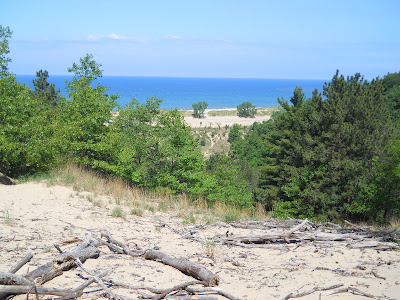Wouldn't it be amazing to be able to travel back in time? Go to the past and see how
things were?
 |
| How does a barren beach become a Forest? At lake Michigan we can see this as we travel inland from the shore. |
The dunes at Lake Michigan are one of the few places on this
planet in which one can do this without having to use one of H.G. Wells’ machines.
They are a living story of how succession happens and vegetation is able to establish
along a barren beach to eventually become a forest. As a field class at KBS our
class could not leave the chance of visiting Saugatuck State Park to study the
dunes.
 |
| Very big stairs for a very tall dune system! |
After climbing around 300 steps, we started appreciating the
beauty of the dunes. One of the first things we saw was a blow out (where we
got to have our lunch). Blow outs are areas
that erosion due to animal behavior (including us), wind and water action have
turned back into bare sand with a few species. They are “islands” in the middle
of the forest, that have been taken back to the first stages of succession.
 |
| Blowouts give us a feel for how delicate the dunes are and how disturbance such as wind, rain or simple footprints can destroy it or seriously damage it. |
 |
| The coast along Lake Michigan, crowned by the dunes. |
The next stage of the
dunes is wetpannes. They are areas of the dune that have sank, sometimes all
the way up to the water bed, acting as a pit. The wetpanne at Saugatuck was not
that dramatic, but it gives rise to the backdune, which is the oldest part of
the dune, and the present. It looks just like a forest, with a lot of woody
plants and giant trees.
 |
| As part of our activities, we had a scavenger hunt for common species at each stage of the dune in which we had to look for species like this panicum grass. |
Once within the forest, where the vegetation dense and highly diverse, it is hard to imagine that you are still in a dune. It is incredible to think that all these plant and animal species are able to survive in such a hard environment like sand and are together able to withstand erosion.
 |
| Would you believe this is found in a dune? |
The dunes at Lake Michigan have been one of the key places that have led to the undrstanding of succession. Having the oportunity to see these and experience succession has been one of the greatest parts of our class!
No comments:
Post a Comment